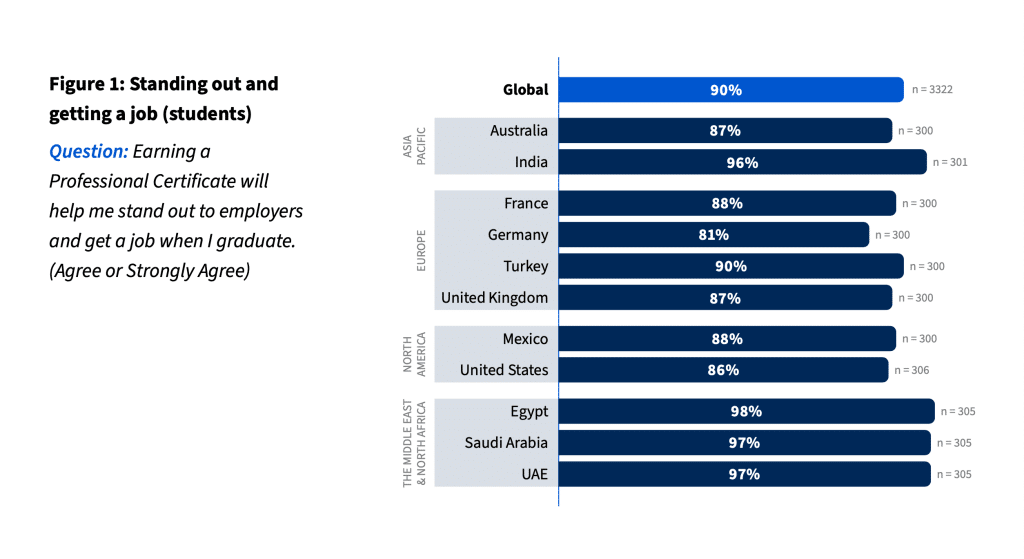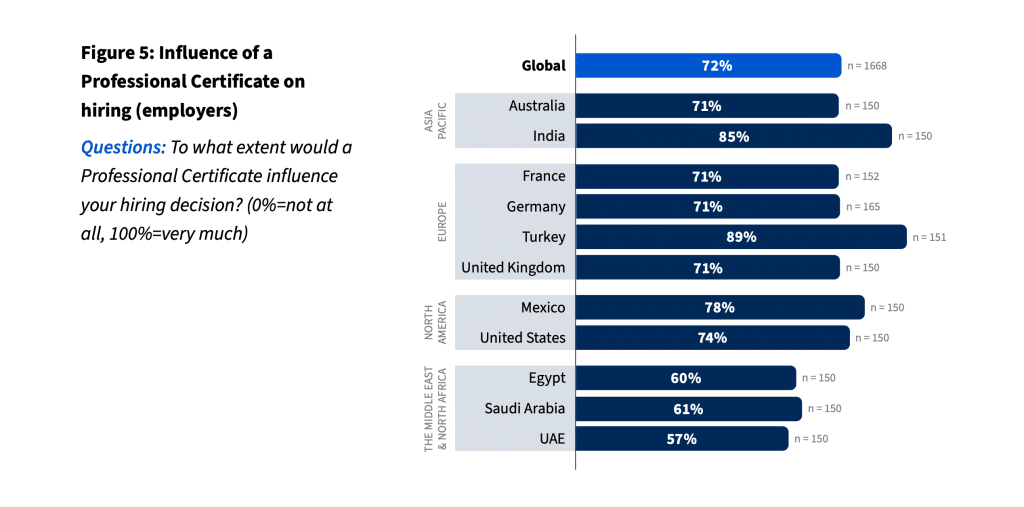
By Scott Shireman, Global Head of Coursera for Campus
In a competitive and fast-changing labor market, employers increasingly expect their entry-level talent to join their workforce already equipped with job-relevant skills and hands-on experience. At the same time, university-age students and their parents are thinking more critically about the ROI of traditional three and four-year degree programs: most notably, whether students will secure a job after graduation.
As a result, Coursera is seeing universities and colleges around the world leverage entry-level professional certificates, also known as industry microcredentials, and career-relevant skills training in their degree programs to improve student recruitment and graduate employability.
To better understand this phenomenon, Coursera surveyed nearly 5,000 students and employers across 11 countries—Australia, Egypt, France, Germany, India, Mexico, Saudi Arabia, Turkey, the United Arab Emirates (UAE), the United Kingdom (UK), and the United States (U.S.) in collaboration with two market research firms, Dynata and Repdata. In each country, we explored the motivations, needs, and challenges of both students pursuing a degree and employers who seek to hire them.
Among other compelling data points, we found that 90% of students and recent graduates said including industry micro-credentials, or in this case, entry-level Professional Certificates, in an academic program would make them more likely to enroll in that program.
The key findings from the Advancing Higher Education with Industry Micro-Credentials Report include:
Students and recent graduates globally believe industry micro-credentials make them more likely to land a job.
- 44% identified their ability to get a job among the top three factors motivating their decision to enroll in a degree program. Employability was ranked ahead of academic strength, reputation, and cost, and came second only to the institution’s location.
- More than half (55%) want to earn a Professional Certificate that counts as credit towards their degree.
- 90% agree or strongly agree that earning an entry-level professional certificate will help them stand out to employers and secure jobs when they graduate – and 86% agree that a micro-credential would help them succeed in their job.

Industry micro-credentials help hiring decision-makers solve for their top two challenges: identifying and validating applicants’ skills.
- Employers both recognize and value industry microcredentials: they are on average 72% more likely to hire a candidate who has earned one.
- 88% of employers either agree or strongly agree that a professional certificate strengthens a candidate’s application.
- 77% of employers are already using or actively exploring skills-based hiring.

These global trends are largely reflected in country-specific data. Among students and recent graduates surveyed in the U.S., for example, 86% agreed that earning an industry micro-credential will help them stand out to employers and get a job after graduation.
- 81% believe that microcredentials will help them succeed in their job once hired.
- 74% said that the inclusion of relevant micro-credentials would influence their choice of a degree program at their university.
- 66% said the credential “counting as credit toward a degree” was their highest motivating factor, while 43% ranked it “being offered by an industry-leading company” at the top.
Among U.S. employers, 86% agree that earning an industry microcredential strengthens a candidate’s job application, while 74% believe that this credential improves a candidate’s ability to perform in an entry-level position.
- 53% said finding applicants with the specific skills needed for the job was the biggest challenge they face when hiring recent graduates.
- 61% ranked human or “soft skills” – important for transformation and change management – such as critical thinking or communication as most difficult to evaluate in the hiring process; tech skills were second, at 55%.
- Not surprisingly, those same employers said soft skills are difficult to find among recent graduates: 65% ranked those skills as most lacking, followed again by tech skills at 46%.
- 61% rank whether a micro-credential comes from an industry-leading company as the most important quality indicator.
- 39% have hired at least one candidate with a microcredential, a signal of a turning tide in hiring approach for employers.
In May, Coursera launched Career Academy to enable students to discover in-demand career paths and learn job-specific skills with industry microcredentials developed in collaboration with Google, IBM, Meta, and Intuit, among others. These entry-level professional certificates as well as applied skills training create job-ready students while simultaneously building more resilient higher education institutions.
Higher education institutions including Boise State, Hawaii Pacific University, Louisiana Tech University, University of North Texas, and the Oklahoma State Regents of Higher Education are leveraging industry microcredentials from Coursera to offer a practical learning experience that pairs academic knowledge with the practical skills needed to succeed in a professional role.
By linking skills-based learning to skills-based hiring, higher education institutions can fill gaps in their curricula and build a bridge between their degree programs and the demands of today’s employers. At the same time, employers can diversify their hiring pipelines while being assured that their new hires are job-ready.
To download the full report and explore the key findings, visit here.
Editor’s Note (February 2, 2023): This blog post has been updated to reflect expanded survey results from the following countries: Egypt, Saudi Arabia, and the UAE. The global figures have been updated accordingly. Our sample sizes enabled us to obtain results with an industry-standard range of error at a 95% confidence level.
The post New Coursera survey shows high demand for industry micro-credentials from students and employers in tight labor market appeared first on Coursera Blog.


Leave your comment